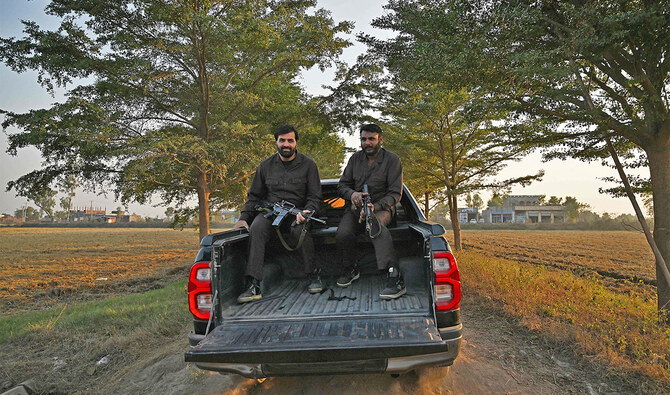DUBAI: Having helped three different restaurants achieve three Michelin stars, French patissier Benjamin Clement was quite a catch for La Petite Maison, where he is currently group pastry chef, overseeing the menu and training at several outlets, including in Riyadh, a position he has held since 2022.
Clement says his passion for pastry began at “a very young age,” experimenting in his family’s kitchen. He studied at the Lycée Hôtelier Les Petites Bruyères in France, earning a degree in food, baking and pastry.
Here, Clement discusses tasting, tang, and teamwork.

Carpaccio of Yellowtail. (Supplied)
What was the most common mistake you made when starting out?
Not fully engaging with the process of tasting. Just as our brains require time and effort to develop and learn new concepts, our palate also needs to be trained to recognize and appreciate a wide range of flavors. Tasting is not a passive experience; it demands focus, attention, and practice to truly grasp the intricacies of different tastes and their unique characteristics.
What’s your top tip for amateur chefs?
Cook your meals with love, because no flavor can compare to that of a dish made with heart and dedication. When you take the time to prepare food with care, passion, and attention to detail, it elevates the meal. The love you put into the process infuses every bite, turning simple ingredients into a memorable experience that nourishes both the body and the soul. There’s a special kind of magic in food crafted with thoughtfulness, transforming it into much more than just a meal; it becomes a true labor of love.

Snails. (Supplied)
What one ingredient can enhance any dish?
For me, lemon juice is a vital element of seasoning. Its bright, tangy acidity cuts through richness and adds a refreshing layer of complexity, lifting and balancing flavors in a way few other ingredients can. Whether it’s a splash in a marinade, a finishing touch on a salad, or a dash over grilled fish, lemon juice brings out the best in other ingredients.
When you go out to eat, do you find yourself critiquing the meal?
I make an effort not to, as it can detract from the emotional connection and joy of the dining experience. That said, there are times when my natural inclination to analyze kicks in, and it becomes challenging to immerse myself fully in the moment — my tendency to dissect the flavors, presentation, and technique can sometimes prevent me from enjoying the meal as purely as I’d like.
What’s your favorite cuisine?
French. It holds a special place in my heart because it evokes fond memories of home. The rich flavors, elegant presentations, and the wide variety of dishes transport me back to cherished moments shared over meals with family and friends. The artistry and attention to detail in French cooking truly captivate me, making each dining experience not just a meal but a delightful journey down memory lane.

La Petite Maison. (Supplied)
What’s your go-to dish if you have to cook something quickly at home?
Pasta. It’s incredibly easy and fast to make, and it also offers endless versatility in terms of toppings, sauces, and flavors. Whether it's a simple aglio e olio, a rich marinara, or something creative like a pesto with seasonal vegetables, pasta allows me to experiment while still being time-efficient. The flexibility is what I love most, as it lets me mix and match ingredients based on what I have on hand, so I never get bored of it.
What customer behavior most frustrates you?
Today, appearance often takes precedence over flavor. Social media certainly influences this trend, as many guests prioritize capturing the perfect photo over fully enjoying their meal. As a result, dishes are frequently assessed based on their visual appeal rather than the overall dining experience. This shift highlights the importance of aesthetics in attracting attention, but it can sometimes overshadow a genuine appreciation of taste and flavor.
What’s your favorite dish to cook? And why?
Roast chicken with potatoes is a classic French family dish typically enjoyed during Sunday meals. What makes this dish even more special is that it’s often prepared using home-grown ingredients, adding a personal touch and a burst of fresh flavor to the meal. It always reminds me of a leisurely Sunday gathering around the dining table with loved ones, celebrating the simple pleasures of home-cooked food made with care and love.
What’s the most challenging dish for you to get right?
A Floating Island. It’s a classic dessert — simple and elegant, but mine never quite measures up to my mom’s version. Her take on this traditional dish is truly special; the way she balances the airy meringue with the velvety custard and adds her own unique twist makes it unforgettable. Each bite transports me back to my childhood and fills me with warmth and nostalgia.
As a leader, are you a disciplinarian? Or are you more laidback?
Early on, I was more of a disciplinarian, believing that strict guidelines and expectations were the keys to success. But as I gained experience, I realized that each individual responds differently to different styles of leadership and that led me to understand the profound importance of fostering strong, trusting relationships with my team members. When they feel valued and understood, they’re more motivated and engaged, which ultimately means higher performance. So emphasizing connection and empathy in my leadership has made for a more positive and productive work environment.
Chef Benjamin’s La Petite Duchesse Rose recipe

INGREDIENTS
Choux pastry:
96g water
96g whole milk
Sprinkle of salt
Sprinkle of caster sugar
90g butter
108g flour
180g whole eggs
Craquelin:
75g butter
90g sugar
90g flour
Pink colorant
Crème Légère jasmin:
300g whole milk
60g jasmine tea
50g egg yolk
56g caster sugar
32g cornflour
37.5g butter
Raspberry compote:
1500g frozen raspberry
500g caster sugar
30g pectine
45g lemon juice
Pink glaze:
1500g cream
1100g neutral glaze
16 gelatine leaf (gold)
1750g Ivoire chocolate
Q.S pink colorant
Raspberry ganache:
150g raspberry frozen puree
75g whipping cream
275g white chocolate
20g butter
INSTRUCTIONS:
Bring the water, whole milk, salt, caster sugar and butter to a boil.
Remove from the heat and add the flour, stirring until it forms a dough.
Return the dough to medium heat and cook for a couple of minutes to dry out the Pâte à Choux.
Transfer the dough to a mixer and add whole fresh eggs one at a time. Pipe the dough into 10g and 20g portions. Preheat the oven to 210°C, place the Pâte à Choux inside, and turn off the oven for 10 minutes. Afterward, bake at 180°C — eight minutes for the small choux and 12 minutes for the larger ones.
Mix all remaining ingredients together, then roll the dough and place it in the freezer.
Cook the custard for two minutes at a boil. Add the gelatin and butter at the end, then mix and allow to cool in the fridge. Once cooled, smooth the custard using a KitchenAid with a paddle attachment. Gently fold in 60g of whipped cream using a spatula (Maryse), then transfer the custard to a piping bag.
Defrost the frozen raspberries with caster sugar (1). Mix pectin NH with caster sugar (2) and add it to the raspberry mixture. Cook until it reaches a boil, then continue cooking for two minutes. Add lemon juice and cool the mixture in the fridge.
Bring the cream and neutral glaze to a boil, then melt the gelatin into it. Pour over Ivoire chocolate and mix thoroughly. Add the food coloring using a hand blender, strain the mixture, and bring the glaze to 28°C for glazing.
Bring raspberry purée and whipping cream to a boil, then pour over white chocolate. Create an emulsion, and when the mixture reaches 40°C, add butter. Store in a container with cling film directly touching the surface and place in the fridge.
ASSEMBLY
Fill the choux buns with the jasmine cream and raspberry compote.
Dip each choux in the pink glaze.
Place the small choux on the top of the big choux.
Decorate with raspberry ganache, fresh raspberry, and edible flowers.
Decorate the plate with pink glaze.






















